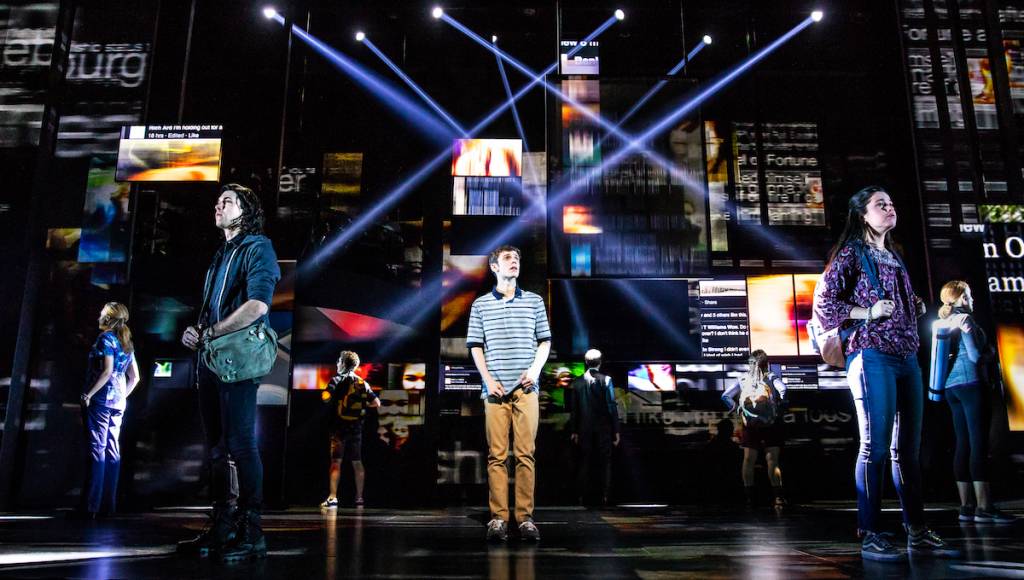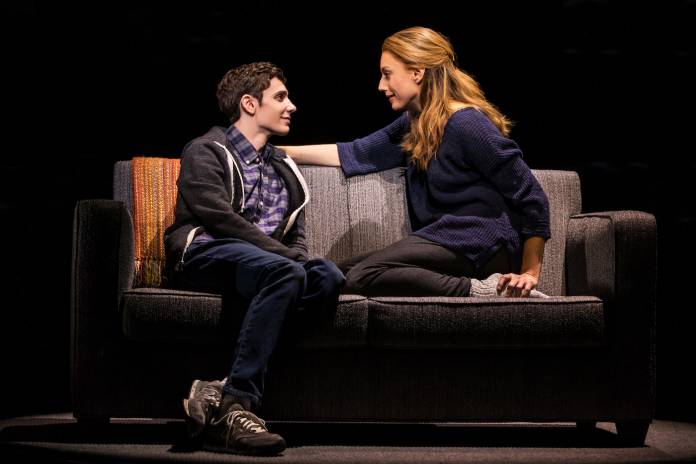ONSTAGE I admit I raced to see Dear Evan Hansen (through December 30 at the Curran) out of spite. Not to mock the smash-hit Grammy/Tony-winning musical’s swooning fans, who sing along to every word of the driving emo-meets-country-pop soundtrack (I love them, they are the future of this art). Nor to puncture the earnest hashtag marketing that sprang directly from the plot into the viralsphere (#YouWillBeFound could and maybe should be a generation’s rallying cry).
No, it was this incredibly crabby review of the the LA production in right-wing rag American Thinker—let’s just say the name isn’t too descriptive of the contents—by Patricia Miller that jerked my chain. The cranky screed, titled “Dear Evan Hansen Celebrates All the Wrong Things,” has it all: fist-shaking at modern society, absolute obliviousness to the workings of irony or dramaturgy, and, of course, rage at the scourge of those darned millennials. “The millennials who now write and produce the entertainment to which we all subjected have no moral clarity, no real sense of absolute right and wrong,” Miller writes. “They are not morally discerning.”
This conservative knee-jerk against Dear Evan Hansen (whose writers and composers are indeed dreaded millennials, now in their 30s, how dare they) surprised me, since a bare bones summary of the plot, which centers on a hetero white male cis-male from a “broken” home so eager to impress a girl and fit into her wealthy nuclear family that he plays along with a series of escalating dramatic events, seems anathema to any leftist.
And, as if to underline the play’s resolute lack of subversive intent—in the end, adorable Evan Hansen may find inner strength through wrestling with the truth, but he’ll hardly be taking to the barricades—City Hall itself was lit up on opening night with the play’s chosen promotional color, blue. Not a Republican’s first choice, OK, but totally neoliberal-friendly and solidly American.
It’s all in the telling, though, isn’t it? Dear Evan Hansen‘s sincere heart and fantastic performances light up a production that has you rooting all the way through for its hero and his circle. Despite its rather Hallmark Channel plot outline, the story is fleshed out in some unexpected ways—it’s a kind of teenaged Next to Normal meets zombie Cyrano de Bergerac with a dash of Heathers in there somewhere and a jolt of American Idiot suburban-solipsistic energy. Somehow it works—thrilling music by Benj Pasek and Justin Paul plus David Korins’ brilliant social-media-immersed set design are key—and you’ll likely be left a wet puddle by the end.

Awkward, medicated, and therapatized Evan (a winning Ben Levi Ross, who manages to make two hours of teenage social tics endearing) lives with his hardworking single mother, Heidi (Jessica Phillips) and seems to have the same problems most other teenage boys have—his hands sweat when he attempts to talk to his crush Zoe Murphy (Maggie McKenna) and he’s having trouble getting psyched about college application essays. His discouraging high school milieu also includes ambitious overachiever Alana (Phoebe Koyabe), ever-scheming cousin Jared (Jared Goldsmith), and Zoe’s bully brother Connor Murphy (Marrick Smith).
Evan’s been writing daily affirmations to himself at his therapists’ request: When anger-bear Connor steals one and then later kills himself, Evan’s letter is mistakenly seen as evidence of a deep bond between them, two people not known to have any friends. Connor and Zoe’s well-to-do, previously self-absorbed parents (Christiane Noll and Aaron Lazar), desperate with grief and guilt, cling to the idea of Evan as the repulsive Connor’s bestie as a kind of redemption. Their semblance of a traditional family life—Evan’s dad flew the coop years ago—and the sudden attention of Zoe cause Evan to go along with the misunderstanding, partly out of pity, partly out of confusion, and partly out of self-interest.
The play then becomes a skillful examination of how social media and contemporary grief rituals can amplify the smallest deceptions into worldwide “fake news.” Evan discovers his voice (and a way to Zoe’s heart) by falsifying friendly emails from Connor while the school duly turns out for a kind of mourning-as-pep-rally, complete with inspirational viral speeches, clever hashtags, a crowdfunding campaign, and RIP Connor Murphy swag. Everything of course spirals out of control, but the ending’s more bittersweetly ambiguous than one would expect, and there are some astute observations of social class differences, how we develop stories about ourselves, and the insane pressures put on young people along the way.
There are some jarring moments of tone in the script—methinks this is what really threw our American Thinker off—including jokes about “school shooter chic” and graphic gay sex, but taken in context they are actually appropriate to mouthy high schoolers, and nothing that hasn’t been around since movies by the Farrelly Brothers (who are now, I must add, in their 60s).
The cast is uniformly great. Ben Levi Ross, onstage most of the time, affectingly navigates the moral conflicts of a teenage boy drowning in society’s expectations, while suddenly glimpsing absolute power and privilege. Phillips as mom Heidi brings a tender-tough Lucinda Williams touch and melts the audience in her climactic number. McKenna as Zoe plays it sweet but smart, while Smith’s Connor, first as Neanderthal Keanu Reeves and then as Evan’s friendly, ghostly conscience, handles the range well. (There are a couple musical clunkers here—the sappy “To Break in a Glove” and the razzle-dazzle “Only Us”— and the way Evan’s relative Jared is written and played leans a little hard on Jewish stereotype.)
That the social media that’s lampooned onstage has jumped past the curtain to become the main marketing tools of the production is fascinating, and wholly of our moment. #YouWillBeFound (pinched from Evan’s viral inspirational speech) is both earnest and ironic, and, sure, disturbing in the context of the play’s moral universe. “The audience stands and cheers, as it did after every insipid song, as though they’ve just seen West Side Story or The Sound of Music for the first time,” our American Thinker critic despairs. “Those musicals had glorious music and real stories based on human experience: conflict, joy, love, war and history.”
Those musicals also had racism, sexism, underage desire, assault, Nazis, overbearing religion, and violence. Dear Evan Hansen may not have much to say politically, but it does tell the story of a certain contemporary kind of human experience that should be told onstage.
DEAR EVAN HANSEN
Through December 30
Curran Theatre, SF.
More info here.





